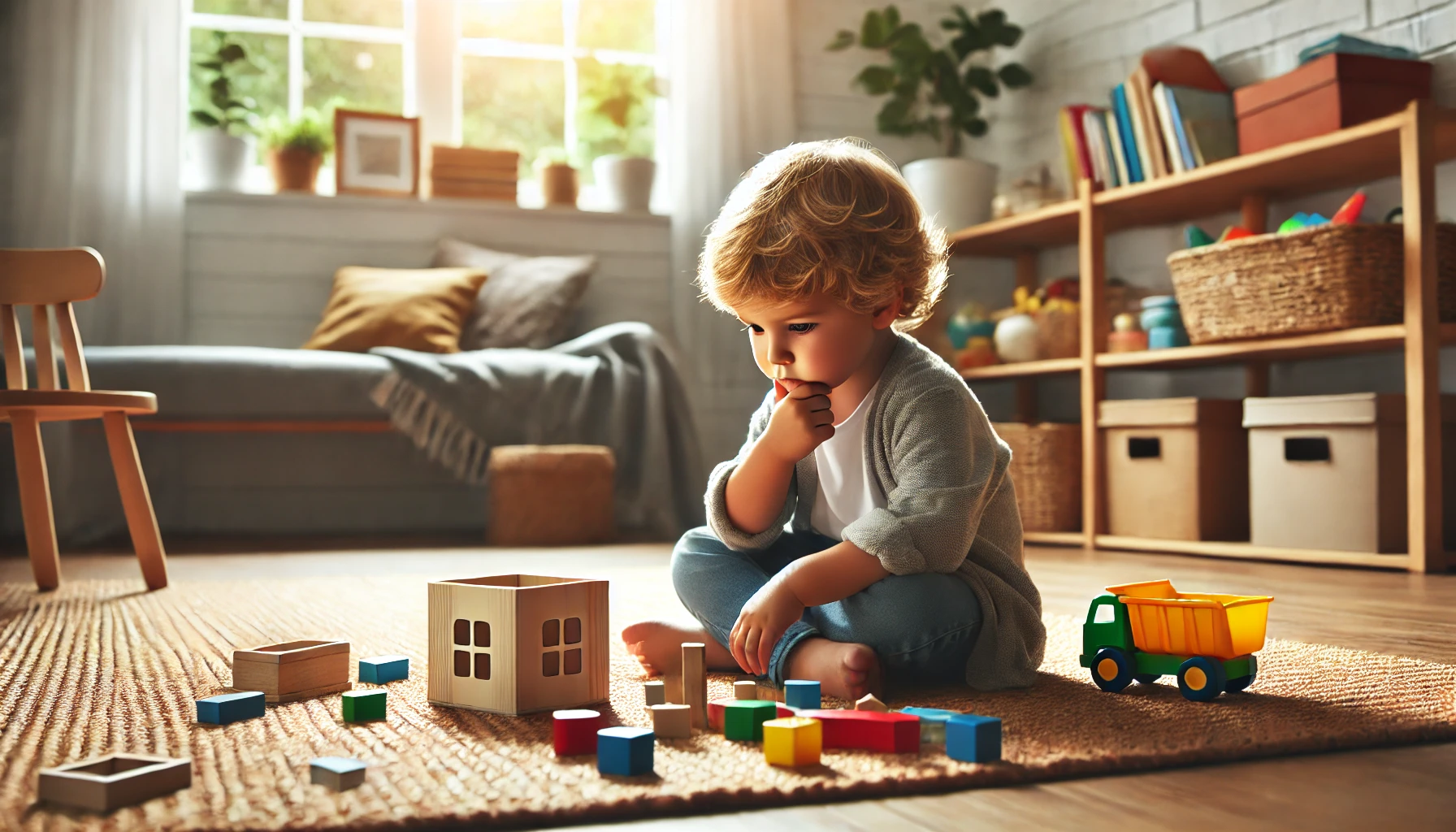Critical thinking supports many areas of a child’s development, including:
- Problem-solving: Helps children approach challenges with confidence and flexibility.
- Language development: As kids explain their thinking, they develop communication skills.
- Emotional growth: They learn to tolerate frustration and persevere.
- School readiness: Children become better prepared to engage in learning with curiosity and independence.
And most importantly: critical thinking empowers children to become lifelong learners.
Ask Open-Ended Questions
When your child is playing, avoid questions with yes/no answers. Try instead:
- “Why do you think that happened?”
- “What else could we try?”
- “How could we fix this?”
- “What would happen if…?”
These questions encourage your child to reflect, imagine possibilities, and explain their reasoning.
Offer Open-Ended Toys
Simple toys like building blocks, magnetic tiles, animal figurines, or household items like boxes and containers spark creativity and problem-solving. Because there’s no one “right” way to use them, children explore, experiment, and think critically on their own terms.
Play “What If?” Games
This is a fantastic way to combine creativity and logic:
- “What if we lived in a treehouse?”
- “What if your toys came alive?”
- “What if we had to make dinner without a stove?”
Encourage your child to come up with stories, solutions, or plans — even silly ones! They’re learning to connect ideas and think outside the box.
Introduce Everyday Challenges
Use routines to build thinking skills:
- “Can you figure out how to fit all your toys in this bin?”
- “How many ways can we fold the towels?”
- “How would you set the table for four people?”
These moments teach planning, testing, and evaluating solutions.
Let Them Struggle a Little (With Support!)
When your child faces a challenge, don’t jump in too quickly. Offer encouragement and questions to guide their thinking:
- “What have you tried so far?”
- “What else could you try?”
- “What do you notice about the pieces?”
This process builds resilience and confidence — both crucial for independent thinking.
Encourage Sorting, Matching, and Classifying
These are natural early thinking skills. Use items from around the house:
- Sort toys by color, size, or shape
- Match socks or lids to containers
- Classify fruits by taste or texture
Asking “Why did you put those together?” gives you insight into your child’s thought process — and encourages them to reflect.
Use Books and Stories to Spark Thought
While reading together, pause and ask:
- “What do you think will happen next?”
- “Why did the character do that?”
- “What would you have done?”
This invites your child to analyze motives, make predictions, and engage with the story on a deeper level.
Turn Mistakes Into Thinking Moments
If your child makes a “mistake,” frame it as a learning opportunity:
- “Hmm, that didn’t work. Why not?”
- “Let’s figure out another way.”
This reinforces the idea that effort and experimentation are valuable — and builds a healthy mindset for learning.
Try Activities That Build Thinking Skills
Puzzle Time
Jigsaw puzzles teach patience, attention to detail, and pattern recognition.
Treasure Hunts
Create a simple scavenger hunt with clues. Let your child solve problems, follow steps, and work through frustration.
Building Projects
Use blocks, recycled materials, or cardboard to build something creative. Ask questions like “How can we make it stronger?” or “What do you want it to do?”
Guessing Games
Play “What’s in the Bag?” using mystery items. Let your child feel and guess based on touch, then explain their reasoning.
Obstacle Courses
Create indoor or outdoor obstacle courses and ask your child to design a path or change it. This teaches spatial awareness, planning, and creative problem-solving.
Adapting to Different Ages
Toddlers (1–3 years old)
Focus on cause-and-effect toys and ask simple questions like “Where did the ball go?” or “Can you find the red block?”
Preschoolers (3–5 years old)
Introduce basic challenges: matching, sorting, building, and pretend play with rules. Encourage storytelling and asking “why” and “how.”
Early School Age (5–7 years old)
Challenge them with projects that involve multiple steps. Let them invent, plan, and test ideas. Introduce basic logic games or cooperative board games.
Common Mistakes to Avoid
Over-Correcting
Try not to jump in too fast or tell your child exactly how to do something. Give space to think and try.
Expecting One Right Answer
Open-ended play is about the process, not perfection. Celebrate effort and curiosity over getting it “right.”
Over-Scheduling
Children need time for unstructured play — this is when critical thinking often blooms.
Final Thoughts
Fostering critical thinking in your child doesn’t require special tools or fancy lessons — just a little intention and a lot of trust in your child’s natural curiosity. Through play, they learn to question, problem-solve, and make decisions — all while having fun.
Every question you ask, every pause you give, and every moment you allow for exploration helps your child build a stronger, more flexible mind. And that’s the kind of magic that lasts a lifetime.
